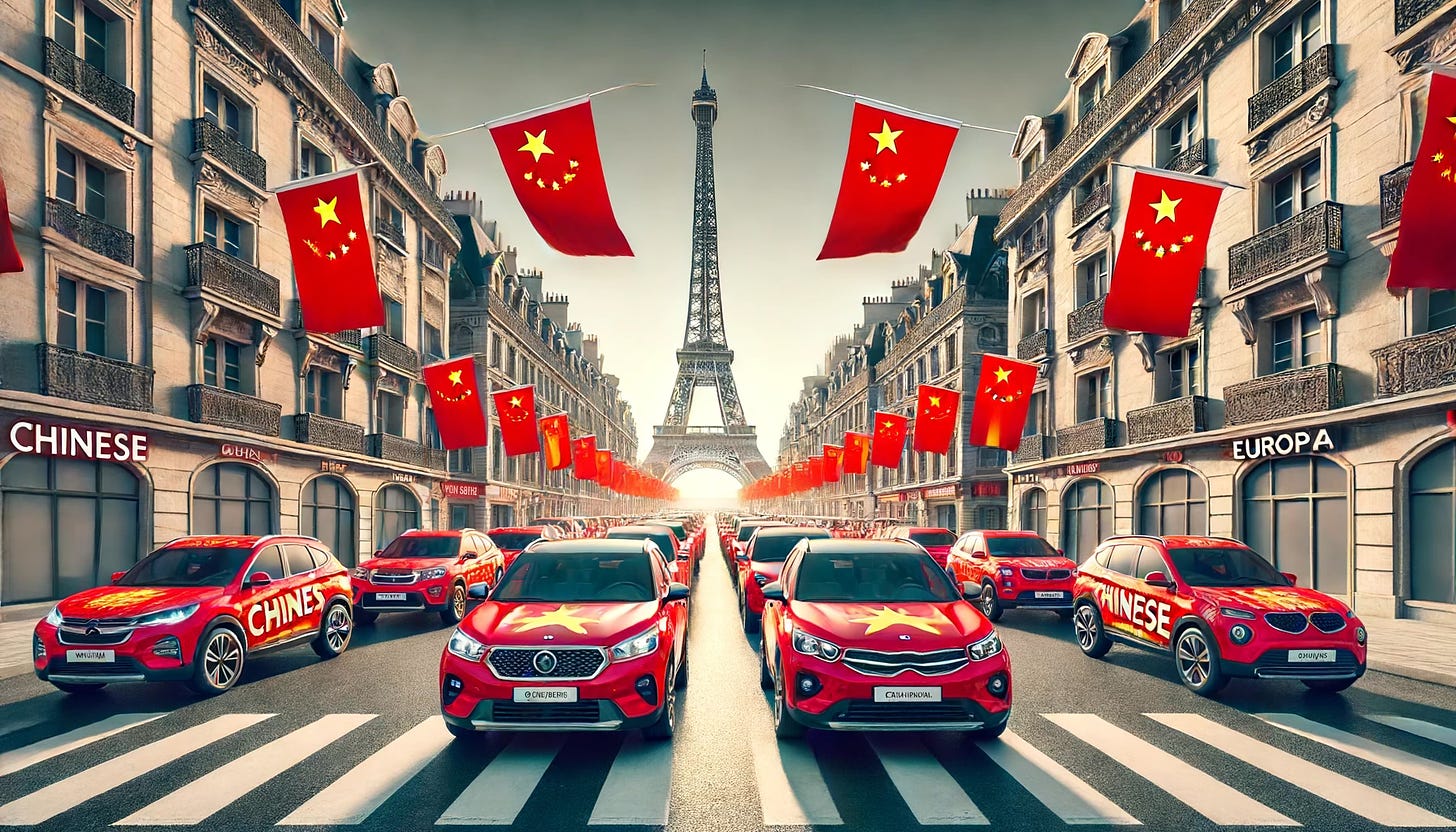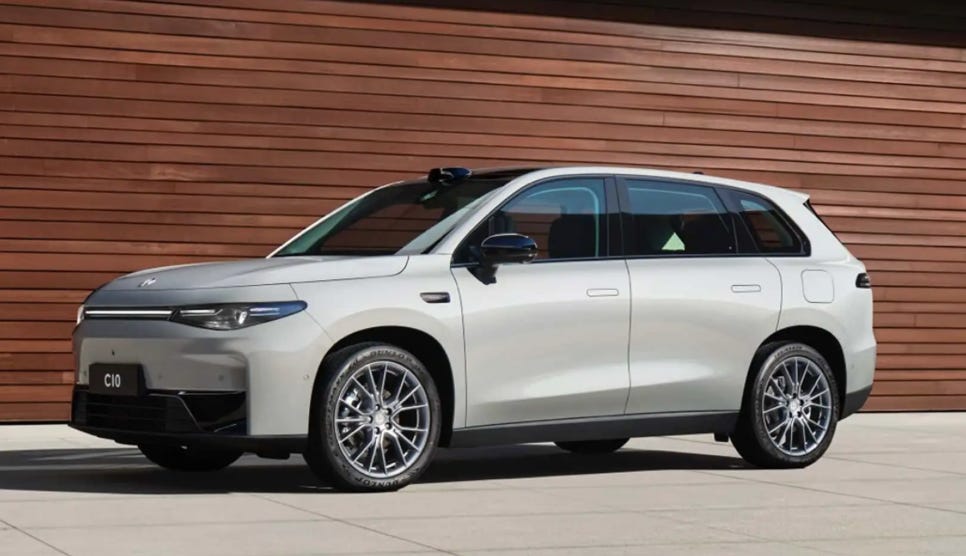...EU car makers can't compete with China to produce a cheaper EV, not with higher wages and energy costs in EU, so they have been making them in China.
...Globalisation is not exactly dead, not if consumers want to have cheaper products.
Made-in-China EVs headed for Europe will top 500,000 units this year, one out of every four EVs sold in Europe.
1 in 4 of every EV sold in EU is made in China! So we should expect China to be the main source of global lithium consumption.
So you can argue about how good the EV adoption and growth in EU, but the lithium that goes into them is mainly consumed in China (for Europe). EU car makers would be in a way relying on China for access to cheaper EV batteries and critical minerals that goes into them.
Lithium hodlers need to know the facts - the future of their stock is linked to spot/market pricing in China more than they are prepared to admit and accept.
How China Is Assisting A European Suicide
Tariffs won't help. Stellantis, Mercedes, Renault and Volkswagen are in deep trouble.
MICHAEL DUNNE
JUN 20, 2024
How China Is Assisting A European Suicide
China now ships hundreds of thousands of cars a year to Europe. The EU Commission has hit Chinese automakers with punitive tariffs, citing subsidy abuse. Tensions are escalating fast.
What happens next?
I played out possible scenarios in my mind last week while at I Fratellini, a charming little cafe in downtown Florence. Behind the counter, I noticed a pair of Italian men crafting the sandwiches. Next to them, a young woman working the register.
"Where are you from?" I asked her in Chinese. "Fujian," she answered with wide eyes. "And that's my boss," pointing to an Italian man walking up, his arms full of supplies for the kitchen.
Domenico shook my hand. "I met my wife in China 7 years ago.”
"He's the owner here," the young woman from Fujian chirped from behind the register, "I just help watch the money."
In a few words, the young lady captured how China is conquering the European car market: European products upfront, Chinese in charge from the back.
• • •
Think of the new European tariffs on Chinese cars like a glancing blow thrown by a fading heavyweight fighter, one that will not stop China's advance. The reality is that the Chinese are already woven into the fabric of Europe's car markets—and often in partnership with the Europeans themselves.
Made-in-China EVs headed for Europe will top 500,000 units this year, one out of every four EVs sold in Europe. Chinese automakers will ship a further 400,000 gasoline powered vehicles to Europe as well.
Many of those Made-in-China cars will carry European badges - familiar names like Volvo, Mini, and Smart, and less well-known ones like MG and Lotus.
Some European companies will be unwitting accomplices to further gains by Chinese automakers on the continent.
How did we get here?
Planting Seeds, Taking Names
In some ways, the Chinese have been preparing for this moment for two decades.
Standing in line for a taxi in front of the Peace Hotel in downtown Shanghai in early 2005, I overheard British dealmakers talking about selling the MG brand.
A few months later, a small automaker from Nanjing bought the rights to the MG brand name from Phoenix Motors.
Five years later, in 2010, Geely-founder Li Shufu acquired Volvo from Ford for $1.8 billion. Chairman Li understood that buying Volvo would give him two things he did not have: world-class R&D, and a globally powerful brand.
Chairman Li extended his reach into Europe in 2018 when companies under his control invested $9 billion to acquire 9.6% of Mercedes-Benz.
With a single stroke of the pen and a series of highly disguised wire transfers, Li became the single largest shareholder in Germany's most prestigious brand.
That is not all. In recent years, Li has added Lotus and London Taxi Company, spun out Polestar, and created Lynk & Co within his portfolio of European brand names.
Then, in early 2020, Geely formed a 50-50 joint venture with Mercedes to build Smart vehicles in China and sell them worldwide.
Geely was not the only one with significant interest Mercedes. In 2021, Beijing Automotive Industry Corporation — Mercedes' main partner in China — revealed that it has been holding a 9.9% stake in Mercedes since 2019. Link
China Speed, China Shock
From 2005 to 2020, Chinese moves to acquire European assets were seen as quaint and curious, but not alarming: "Look at that, a Chinese entrepreneur few people have heard of is the No. 1 shareholder in Mercedes."
Chinese automakers like Great Wall had tried to enter Europe before—and had fallen on their faces. What was there to worry about?
Fast forward to 2024, and sirens in Europe are now blaring. It feels to European automakers like the Chinese are everywhere, all at once.
• BYD, China's largest automaker, has set up 230 dealerships in 19 countries across Europe. A plant in Hungary will start producing BYD vehicles within three years. BYD executives say that they will reach 5% market share in Europe prior to that.
• SAIC will sell 300,000 MGs in Europe this year, 40% more than in 2023. Link
• Volvo delivered a record 700,000 cars globally last year and is on track to go higher in 2024. Many of the vehicles were produced in one of Volvo's three China factories.
• Chery, China's largest exporter, plans to launch three new brands in Spain and Italy — Exlantix, Omoda, Jaecoo -– as it negotiates acquisition of a shuttered Nissan plant in Barcelona. Link
Reverse JVs, Too
European companies themselves are accelerating China's move into Europe.
In October 2023, Stellantis invested $1.7 billion to acquire a 20% share in Leapmotor. The company leaders agreed vehicles sold outside of China are to carry a Stellantis brand.
Stellantis will start selling 6 different Leapmotor-based models in 9 European cities this September.
This week, Stellantis started building China-sourced EVs at a plant in Poland. Those EVs are designed and developed by Leapmotor. But they will have Stellantis brand names: Citroen, Fiat ... even Jeep. Link
The Leapmotor C10 SUV will sell as a Stellantis in Europe.
Volkswagen and Audi are likely to follow that playbook. In 2023, Volkswagen invested $700 million for a minority stake in Xpeng, a promising EV startup selling in several European markets already. Link
Jaguar Land Rover will revive the Freelander as a Made-in-China EV using Chery’s EV platform. Link
Weaving In
Meanwhile, Chinese companies are also working hard to win European hearts. China's No. 1 automaker, BYD, is the official sponsor of the high-profile UEFA Cup. BYD has also opened a flagship store on that prestigious Parisian avenue, the Champs-Elysées. And another one off of Piazza del Duomo, home of the most coveted real estate in Florence.
So, What Now?
EU Commissioner Ursula von der Leyen is fighting a heroic battle to keep the Chinese at bay. She championed the anti-subsidy probe last autumn that uncovered enough evidence to warrant higher tariffs on Chinese products.
She was not wrong about China's extensive use of subsidies to support its EV industry. BYD alone has collected over $3 billion in subsidies since 2021.
But the tariffs may be too late and too little. The Chinese are already inside – and they have all the leverage. As one Western executive put it to me this week: "The Europeans are screwed."
• China's massive scale, efficient supply chains, and extensive subsidies allow Chinese automakers to produce at 20-30% lower cost than competitors in Europe. The new, higher tariffs will be a minor speed bump.
• Stellantis, Mercedes, Volkswagen, Renault and Jaguar Land Rover have investments in Chinese companies, aligning their interests closely with China.
• Mercedes, Audi and BMW are paralyzed by constant worry about Chinese retaliation to their lucrative businesses in the PRC.
European Allies
Some powerful European leaders are now voicing pro-China views.
In May, Mercedes CEO Ola Kallenius spoke out against higher tariffs on Chinese cars. "Don't raise tariffs," Kallenius said. "Take the tariffs we have and reduce them."
Is it just a coincidence that Geely and BAIC now own 20% of Mercedes?
Like the young woman behind the cash register in Florence said:
"Europe is the owner. We are just here to help watch the money."
- Forums
- ASX - General
- EV/Lithium
...EU car makers can't compete with China to produce a cheaper...
Featured News
Featured News
The Watchlist
PAR
PARADIGM BIOPHARMACEUTICALS LIMITED..
Paul Rennie, MD & Founder
Paul Rennie
MD & Founder
SPONSORED BY The Market Online












